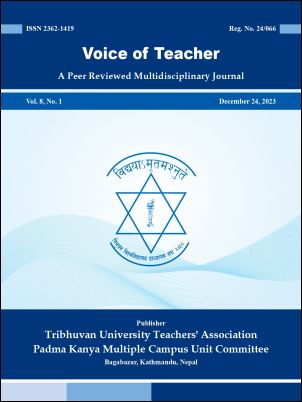“Challenges and Impact of Disaster on Vulnerable Families in Rapti Sonari Municipality, Banke District”
DOI:
https://doi.org/10.3126/vot.v8i1.60824Keywords:
vulnerable, livelihood, floods, resilience, responseAbstract
Nepal is exposed to multiple recurrent hazards. The country falls in the top 20th list of the most multi-hazard prone countries in the world. The country is ranked 4th, 11th and 30th in term of climate change, earthquake and flood risk respectively. The Rapti Sonari Rural Municipality of Banke district is traversed by the west Rapti River from in between. Communities living near the river coastal areas of the municipality are affected by floods every year. In addition to flooding their crops, the water seeps into their houses and damages their stored food and other materials. According to the district disaster preparedness and response plan (DPRP), communities living in the coastal areas of the river of formerly Fatehpur VDC and present Rapti Sonari Rural Municipality wards no. 6 and 7 have been mapped as being at high risk of flooding. Due to the fact that floods during the monsoon damage the paddy fields, the farmers who are vulnerable to the floods are not able to get agricultural production expected hence they are starting to promote winter and spring farming. Such phenomenon’s have caused loss of lives and property in different areas of Nepal and have posed severe hazards to physical infrastructure likes roads and bridges. The floods of August 2008 in Koshi River, Sept. 2008 in Western Nepal and July and August 1993 in the Bagmati and other rivers were the most devastating floods in Nepal. The primary data collection was accomplished himself by the researcher during March 2023. The exploration of gap between policy and practice is the main area of research. What are the best practices, skills and how they (Governmental and nongovernmental organizations) are using this knowledge solving the major problems of poor and vulnerable community is also the issue of research. This study will be helpful for policy makers, stakeholders, province and local government and other researcher to study the well-being and resilience among vulnerable families in targeted area.




